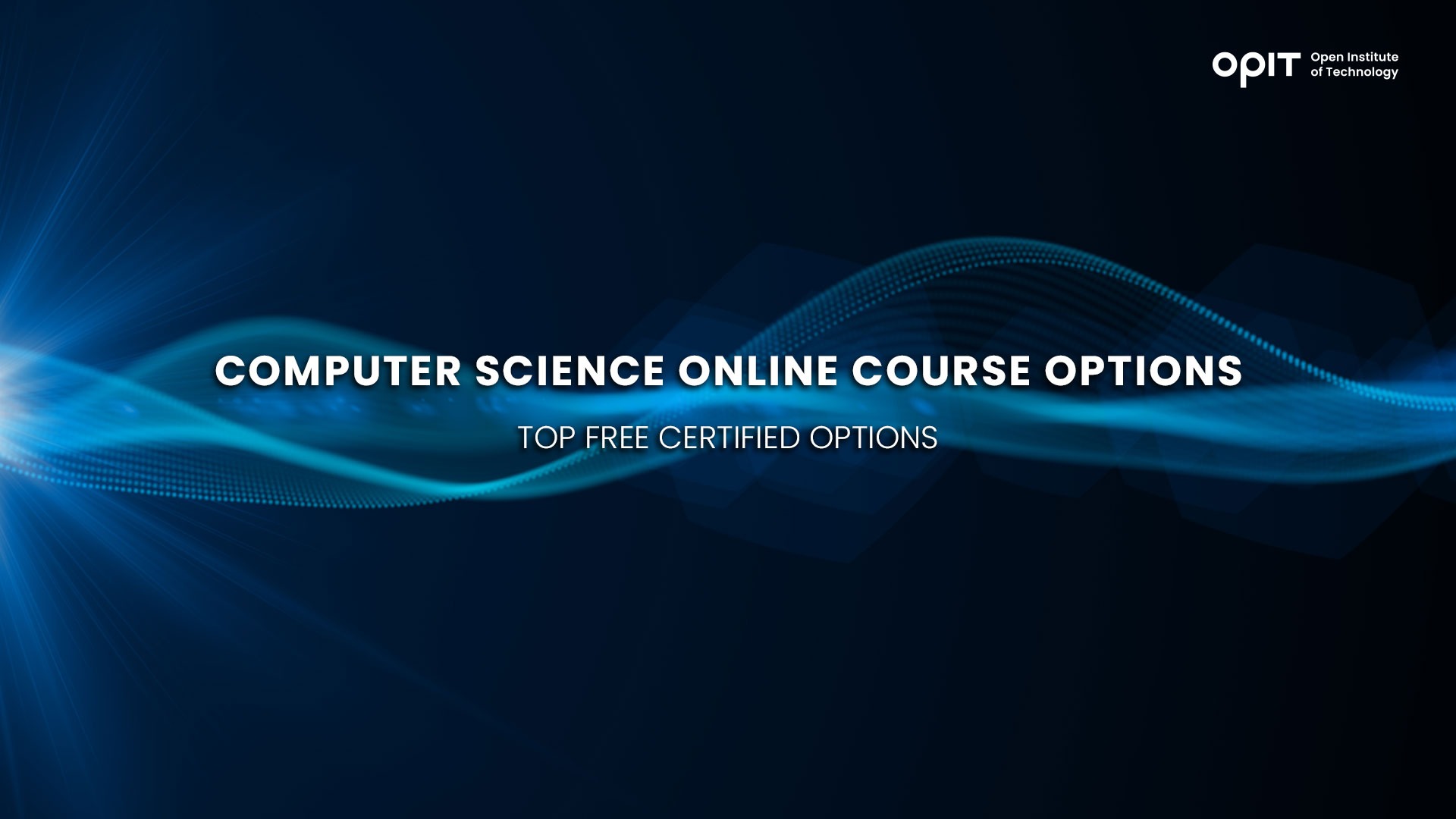Read the full article below (in Italian):


If we think of “computer science” as an umbrella term for so many aspects of computing today, its importance is immediately apparent. Artificial intelligence (and the programming that lies behind it) falls into the computer science category. The same goes for machine learning, data science, networking, cybersecurity, and so many other elements of what make modern computing technology tick.
You need a solid grounding in computer science – both general concepts and theory – to move into one of these areas of specialization. And if you need to get that grounding on a budget, these free computer science courses teach you what you need to know and come with a handy certification.
Top Free Certified Computer Science Online Courses
As surprising as it may seem, you don’t have to pay money to get an education in computer science that employers actually care about. Free courses exist. And many of these free online computer science courses deliver a certification that proves your knowledge and comes from an institution that employers respect.
Course 1 – CS50: Introduction to Computer Science (Harvard University)
We’re stretching the definition of “free and certified” with the first course on the list. Though it’s free to take (and you get an audit of your performance without paying a penny), the verified certification for Harvard’s CS50 course costs $189 (approx. €175).
Assuming you’re willing to part with the cash, this course gives you a certificate from one of the United States’ most respected institutions, in addition to a crash course in computer science fundamentals. Over 11 weeks of self-paced learning (you’ll need to commit at least 10 hours per week to the course) you’ll develop a fundamental understanding of computer science and the programming that underpins it.
Concepts covered include data structures, abstraction, web development, and algorithms, creating a course that melds the math of modern computing with the theoretical concepts you’ll apply in the real world. Prospective programmers enjoy some diversity, too, as the course teaches the basics of several languages. Python, C, JavaScript, and HTML are all covered, though not in enough detail for you to achieve mastery in any of them. Still, as online certified courses for computer science go, CS50 delivers a prestigious certificate and exposes you to ambitious peers who may offer networking potential beyond the course content.
Course 2 – CS50’s Computer Science for Business Professionals (Harvard University)
It’s hard to look beyond Harvard when it comes to free computer science courses because you’re getting education and certification from a top university. With CS50 Computer Science for Business Professionals, Harvard moves beyond the tech-centric approach of its usual CS50 course to demonstrate how computer science principles apply in a real-world setting.
It’s a short course, clocking in at six weeks of study and only requiring two-to-six hours of work per week. That makes it perfect for professionals who want to boost their knowledge without a full-time commitment. You’ll tackle more high-level concepts in computer science, including the fundamentals of cloud computing and how to build technology stacks. All of which makes this like a speed run through of what you need to know about computing on a business level.
That’s not to say you won’t learn any technical theory. Several programming languages are covered (albeit in short-form style), as are the basics of computational thinking. But like CS50 above, certification comes at a cost, even if the course itself is free. Paying for an optional upgrade with EDX (through which the course is offered) is the only way to nab your certificate, if you do get a free course audit to demonstrate completion regardless.
Course 3 – Introduction to Computer Science and Programming Using Python (Massachusetts Institute of Technology)
Offered in conjunction with the EDX platform, this computer science online course takes a Python-focused approach to its teaching. Unlike CS50, which covers a wide range of topics in brief, MIT’s course focuses on how computer science is like a tool that you can use to create software and algorithms. Python 3.5 is the technology behind that tool and you’ll learn how to use it by examining and analyzing real-world problems.
The nine-week course starts by demonstrating the basics of Python (some self-learning and expansion of these concepts may be required) before moving into algorithms. Once you’ve gotten to grips with basic algorithm creation, you’ll learn how to test what you create and how those algorithms become the building blocks of complex data structures.
You have to make a substantial time commitment with this course, with MIT requiring you to spend at least 14 hours per week on your studies if you wish to stick to the nine-week schedule. And though effective in teaching you the basics of Python, the course is really a primer for a second MIT course – Introduction to Computational Thinking and Data Science – that requires payment. But it’s a useful course as a standalone product, but you’ll have to pay a fee to EDX if you want a course-centric certificate.
Factors to Consider When Choosing a Free Certified Computer Science Online Course
The trio of free online computer science courses discussed above each offer something different. Depending on your choice, you’ll get a bottom-up crash course in the theory, a practical understanding of how computer science works in a business context, or an in-depth guide to using Python. But when choosing between the three courses above (or any other courses you find) you must consider the following factors.
The Course Content and Its Relevance to Your Goals
The big question here is – what do you want to achieve with the course?
Sure, having a certificate, especially one with a major university’s name on it, is nice. But if that certificate demonstrates that you’ve learned skills that you don’t need for your intended career path then it’s not worth the paper it’s printed on.
Think of choosing a course like making an investment on which you expect a return. Outline your goals – both learning-centric and career-based – for taking the course. Then, find a course that helps you to reach those goals through laser-focused learning on topics you’ll use in the future.
Course Duration and Flexibility
For a young learner without full-time work or family commitments, taking on a computer science online course that requires months of study may not be a big deal. But that’s not the case for everybody. If you have limited hours available during the week, you need a course that you can fit into those hours rather than one that forces you to fit your life around the course.
Thankfully, most free online computer science courses make allowances for schedule flexibility by taking a self-paced learning approach. You’ll get access to all of the course resources upfront, allowing you to choose when you study. You may be able to get ahead during one week in preparation for a week where you know you can’t commit as much time, giving you the flexibility you need to fit the course into your schedule.
The Instructors and Their Expertise
Would you want to learn the theory of how to pilot a plane from somebody who’s never been up in the air? Of course you wouldn’t, and you must adopt the same attitude when choosing a computer science course.
Check the faculty list associated with the course (most reputable courses tell you who created them) and dig into their individual credentials. What have they done in the computer science industry? Where did they learn what they know? The answers to these questions tell you if your instructors and, by extension, your course are credible.
The Value of the Certification
When it comes to certification, look beyond the website that offers the course and instead focus on the institution that created it. For example, CS50’s Computer Science for Business Professionals is offered via the EDX platform, which doesn’t mean much to potential employers. But that certificate comes with a stamp of approval from Harvard University, which is a school that’s going to immediately raise eyebrows if it’s on your CV.
The point is that reputation matters, though it’s the reputation of the course creator that matters above that of the course platform. The more prestigious the name on the piece of paper, the more valuable the certificate is in the eyes of employers.
Tips for Successfully Completing a Free Certified Computer Science Online Course
With the tips for sifting through the sands of free computer science courses established, let’s round things off with some quick tips that’ll help you succeed in your studies:
- Set clear goals for your education from the outset, with those goals aligning with your current experience level and desired outcomes.
- Create a study schedule that fits around your commitments and stick to it as closely as you can.
- Don’t skip assignments or practical sessions because everything included in the course is there to teach you something valuable.
- Engage with the course community both to get advice from your peers and to potentially create networking opportunities.
- Dedicate time to revision and research when preparing for exams or practical assessments to ensure you fully understand the course content.
Get Certified for Free and Improve Your Job Prospects
Given the importance of computer science to modern business – even the simplest of companies use software and have networks – it’s reasonable to want to build your knowledge of the subject. Free online computer science courses allow you to do that in exchange for a time commitment, with many allowing you to inject some flexibility into your study schedule.
Explore the three courses highlighted here, and look beyond them to more specialized courses once you’re confident in the foundational knowledge you’ve built. And remember – even a certificate from a free course has value in the job market if that course was created by a recognized institution.
Related posts

Source:
- Agenda Digitale, published on June 16th, 2025
By Lokesh Vij, Professor of Cloud Computing Infrastructure, Cloud Development, Cloud Computing Automation and Ops and Cloud Data Stacks at OPIT – Open Institute of Technology
NIST identifies five key characteristics of cloud computing: on-demand self-service, network access, resource pooling, elasticity, and metered service. These pillars explain the success of the global cloud market of 912 billion in 2025
Read the full article below (in Italian):

You’ve probably seen two of the most recent popular social media trends. The first is creating and posting your personalized action figure version of yourself, complete with personalized accessories, from a yoga mat to your favorite musical instrument. There is also the Studio Ghibli trend, which creates an image of you in the style of a character from one of the animation studio’s popular films.
Both of these are possible thanks to OpenAI’s GPT-4o-powered image generator. But what are you risking when you upload a picture to generate this kind of content? More than you might imagine, according to Tom Vazdar, chair of cybersecurity at the Open Institute of Technology (OPIT), in a recent interview with Wired. Let’s take a closer look at the risks and how this issue ties into the issue of responsible artificial intelligence.
Uploading Your Image
To get a personalized image of yourself back from ChatGPT, you need to upload an actual photo, or potentially multiple images, and tell ChatGPT what you want. But in addition to using your image to generate content for you, OpenAI could also be using your willingly submitted image to help train its AI model. Vazdar, who is also CEO and AI & Cybersecurity Strategist at Riskoria and a board member for the Croatian AI Association, says that this kind of content is “a gold mine for training generative models,” but you have limited power over how that image is integrated into their training strategy.
Plus, you are uploading much more than just an image of yourself. Vazdar reminds us that we are handing over “an entire bundle of metadata.” This includes the EXIF data attached to the image, such as exactly when and where the photo was taken. And your photo may have more content in it than you imagine, with the background – including people, landmarks, and objects – also able to be tied to that time and place.
In addition to this, OpenAI also collects data about the device that you are using to engage with the platform, and, according to Vazdar, “There’s also behavioral data, such as what you typed, what kind of image you asked for, how you interacted with the interface and the frequency of those actions.”
After all that, OpenAI knows a lot about you, and soon, so could their AI model, because it is studying you.
How OpenAI Uses Your Data
OpenAI claims that they did not orchestrate these social media trends simply to get training data for their AI, and that’s almost certainly true. But they also aren’t denying that access to that freely uploaded data is a bonus. As Vazdar points out, “This trend, whether by design or a convenient opportunity, is providing the company with massive volumes of fresh, high-quality facial data from diverse age groups, ethnicities, and geographies.”
OpenAI isn’t the only company using your data to train its AI. Meta recently updated its privacy policy to allow the company to use your personal information on Meta-related services, such as Facebook, Instagram, and WhatsApp, to train its AI. While it is possible to opt-out, Meta isn’t advertising that fact or making it easy, which means that most users are sharing their data by default.
You can also control what happens with your data when using ChatGPT. Again, while not well publicized, you can use ChatGPT’s self-service tools to access, export, and delete your personal information, and opt out of having your content used to improve OpenAI’s model. Nevertheless, even if you choose these options, it is still worth it to strip data like location and time from images before uploading them and to consider the privacy of any images, including people and objects in the background, before sharing.
Are Data Protection Laws Keeping Up?
OpenAI and Meta need to provide these kinds of opt-outs due to data protection laws, such as GDPR in the EU and the UK. GDPR gives you the right to access or delete your data, and the use of biometric data requires your explicit consent. However, your photo only becomes biometric data when it is processed using a specific technical measure that allows for the unique identification of an individual.
But just because ChatGPT is not using this technology, doesn’t mean that ChatGPT can’t learn a lot about you from your images.
AI and Ethics Concerns
But you might wonder, “Isn’t it a good thing that AI is being trained using a diverse range of photos?” After all, there have been widespread reports in the past of AI struggling to recognize black faces because they have been trained mostly on white faces. Similarly, there have been reports of bias within AI due to the information it receives. Doesn’t sharing from a wide range of users help combat that? Yes, but there is so much more that could be done with that data without your knowledge or consent.
One of the biggest risks is that the data can be manipulated for marketing purposes, not just to get you to buy products, but also potentially to manipulate behavior. Take, for instance, the Cambridge Analytica scandal, which saw AI used to manipulate voters and the proliferation of deepfakes sharing false news.
Vazdar believes that AI should be used to promote human freedom and autonomy, not threaten it. It should be something that benefits humanity in the broadest possible sense, and not just those with the power to develop and profit from AI.
Responsible Artificial Intelligence
OPIT’s Master’s in Responsible AI combines technical expertise with a focus on the ethical implications of AI, diving into questions such as this one. Focusing on real-world applications, the course considers sustainable AI, environmental impact, ethical considerations, and social responsibility.
Completed over three or four 13-week terms, it starts with a foundation in technical artificial intelligence and then moves on to advanced AI applications. Students finish with a Capstone project, which sees them apply what they have learned to real-world problems.
Have questions?
Visit our FAQ page or get in touch with us!
Write us at +39 335 576 0263
Get in touch at hello@opit.com
Talk to one of our Study Advisors
We are international
We can speak in:


